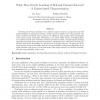Free Online Productivity Tools
i2Speak
i2Symbol
i2OCR
iTex2Img
iWeb2Print
iWeb2Shot
i2Type
iPdf2Split
iPdf2Merge
i2Bopomofo
i2Arabic
i2Style
i2Image
i2PDF
iLatex2Rtf
Sci2ools
118
click to vote
ECCC
2006
2006
When Does Greedy Learning of Relevant Features Succeed? --- A Fourier-based Characterization ---
Detecting the relevant attributes of an unknown target concept is an important and well studied problem in algorithmic learning. Simple greedy strategies have been proposed that seem to perform reasonably well in practice if a sufficiently large random subset of examples of the target concept is provided. Introducing a new notion called Fourier-accessibility allows us to characterize the class of Boolean functions precisely for which a standard greedy learning algorithm successfully learns all relevant attributes. Technically, this is achieved by deriving new relations between the learnability of a function and its Fourier spectrum. We prove that if the target concept is Fourier-accessible, then the success probability of the greedy algorithm can be made arbitrarily close to one. On the other hand, if the target concept is not Fourier-accessible, then the error probability tends to one.
| Added | 12 Dec 2010 |
| Updated | 12 Dec 2010 |
| Type | Journal |
| Year | 2006 |
| Where | ECCC |
| Authors | Jan Arpe, Rüdiger Reischuk |
Comments (0)

